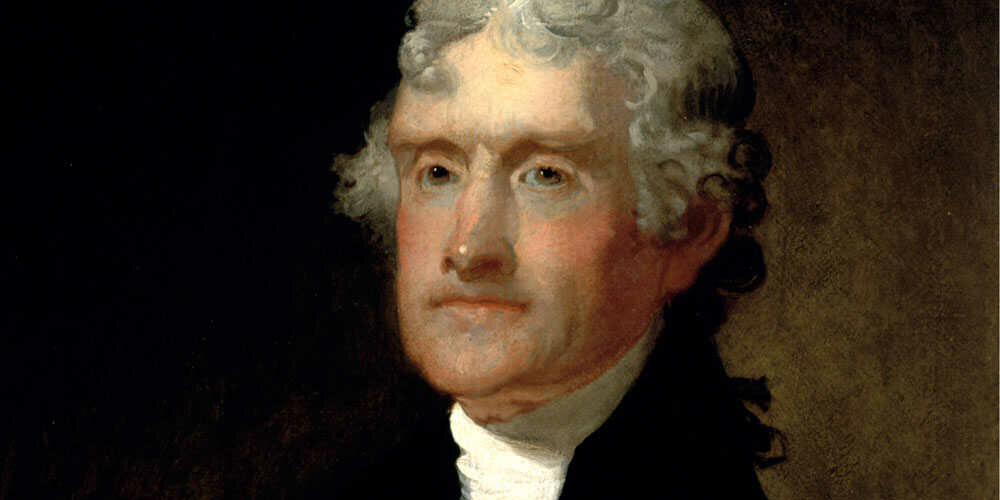A Jeffersonian Future?
Wisdom of the ages tells us (somewhat unhelpfully) that “if something cannot go on forever, it will stop.” Our nation stands at the precipice of an unparalleled $34 trillion dollar debt crisis and a Social Security and demographic collapse. Our post-Cold War military supremacy is rapidly being outflanked by an ascendent and expansionist China. A growing global bloc resents and rebuffs our vision of a liberal world order, a tension exemplified at the Russian front in Ukraine. Meanwhile, within our borders the emotional breakers of the culture wars continue to roll in, tearing ever deeper at the bedrock of our republic. It cannot continue this way indefinitely. A return to Jeffersonian principles of limited, diffuse government offers the most likely (and most peaceful) path forward.
Yes, doomsday prophesying is a perennially over-indulged habit. In fact, the author of the “if-something-cannot-go-on-forever” aphorism, Herbert Stein, made the quip about US national debt spending in 1989, and we seem to have muddled along for more than three decades. Yet the basic outlines of this impending perfect storm are impossible to discount. We should not forget the possibility that it all ends in catastrophe, something akin to Russia’s civil war experience of 1917–22, when Yurii Andreievich Zhivago stumbled about amidst the ruins of a continent tearing itself to pieces—suffering from “the revolutionary madness of the age,” where “everyone could justifiably feel that he was guilty, that he was a secret criminal, an undetected impostor. The slightest pretext was enough to launch the imagination on an orgy of self-torture.” Russians had replaced the authoritarian Tsars with the even more authoritarian Reds, setting off a social cascade where individuals “accused themselves falsely not only out of terror but out of a morbidly destructive impulse, of their own will, in a state of metaphysical trance, in a passion for self-condemnation.”
While the account is technically fiction, it is autobiographical enough (and searing enough) to have convinced Soviet authorities to ban the book and forbid the author, Boris Pasternak, from receiving the Nobel Prize. Pasternak’s descriptions of a nation and a people in freefall are disturbing—let us fervently pray we will never witness anything like it.
I bring up the example because Russia collapsed then (and again in 1991, and probably again quite soon) from the over-centralization of state control. We seem fixed on charting the same course. The primary factor in the leadup to today’s top-heavy instability has been a persistent lean toward ever-greater centralization of power in Washington DC, and I fear we are due for a major reset. Rather than await a calamity, which may initiate the kind of inflate-and-bust model of government perfected by the Kremlin, we would be wise to begin a controlled unwinding, a conscious return to Jeffersonian principles—toward the principles of political smallness and diffusion of power rather than its concentration. We are, after all, fundamentally democratic while Russia was (and is) fundamentally autocratic.
Since our generation is all but guaranteed to see a tectonic shift in the status quo, what might a positive shift, a move towards a semblance of the Jeffersonian ideal look like? Jefferson, recall, prioritized the political individual, one who lives within small, local, self-governing frameworks. He was, in fact, generally against the now-hallowed Constitution, properly predicting it would tend toward concentration of power in a national government.
In American Sphinx, the historian Joseph Ellis notes that in the Declaration of Independence, “the explicit claim is that the individual is the sovereign unit in society; his natural state is freedom from and equality with all other individuals; this is the natural order of things. The implicit claim is that all restrictions on this natural order are immoral transgressions, violations of what God intended; individuals liberated from such restrictions will interact with their fellows in a harmonious scheme, requiring no external discipline and producing maximum human happiness.”
Ellis goes on to say, channeling the zeitgeist of a statist age, that “this is a wildly idealistic message, the kind of good news simply too good to be true. It is, truth be told, a recipe for anarchy. Any national government that seriously attempted to operate in accord with these principles would be committing suicide.” Ellis doesn’t clarify why he imagines spontaneous, harmonious freedom to be such a suicidal course, and in any case, as Zhivago’s experience shows, national suicide and anarchy are hardly constrained to governments that hew strictly to principles of individual liberty—in fact, it seems quite the reverse.
Contemplating A Jeffersonian future requires a shift in mindset—a departure from the allure of centralized power and a return to the principles that defined our nation’s founding.
And is Jefferson’s perspective really so very idealistic? Is it in fact “too good to be true” that communities of sovereign individuals might exist in relatively small, politically accessible units that tend generally toward harmony instead of conflict? Are the cantons of Switzerland (which, by the way, has a GDP/debt ratio of 20% compared to our 120%) howling wastelands of garbage-filled, anarchical mayhem? If not, are the advantages of a confederation of self-ordering political communities being overlooked? Switzerland, Norway, Liechtenstein, and now the UK have found that the advantages of cooperative multilateral co-existence need not require the restraints and bureaucracy of a centralized EU government run from Brussels. Perhaps America’s intellectual and political elites have been ignoring a self-evident truth in their pell-mell dash to demote Jefferson’s “wildly idealistic message” of small government(s).
A Gallup survey shows that only 32% of Americans have a favorable opinion of the “federal government in Washington,” while 54% have a favorable opinion of their state government, and 66% have a favorable opinion of their local government. As US states increasingly invite experiments in federalism properly understood, from Texas claiming authority over its borders, to the long-simmering independence movement of the State of Jefferson, to the Free State Project of New Hampshire, there is an evident shift in national will away from centralized national planning and toward greater local control. The finances of such a move are messy, and it may require massive and painful federal defaults before substantive policy shifts can occur. Things may have to get worse before they get better.
If so, they are likely to get worse soon. The upcoming presidential election, as we all know, promises to be a real doozy, turning the rheostat of politicized angst up to a shrieking roar. The outcome in either case is likely to cause levels of civil unrest not seen in generations. To the political left, the nation appears on the brink of political collapse. The Atlantic has just published a hysterical collection of essays foretelling the demise of democracy itself if Trump is elected, envisioning a totalitarian dictatorship at home and chaos abroad. The conservative right, meanwhile, envisions an imminent financial and social unraveling if Americans don’t “storm the flightdeck” in a repeat of the Flight 93 election. Whichever side loses this next round (and one most certainly will), it’s likely to take to the streets.
A descent into madness is not the only available future of course. An off-ramp toward a less centralized, more federalized, more Jeffersonian system can allow much of the current existential angst to find a release without tearing down the basic edifice of our national legacy. If nothing else, in a Jefferson-style democracy, conflict would be localized instead of nationalized, with important ramifications for broader stability. Contemplating this future requires a shift in mindset—a departure from the allure of centralized power and a return to the principles that defined our nation’s founding. Jeffersonian ideals emphasize local governance, individual freedom, and a healthy skepticism toward concentrated authority.
As we face the growing likelihood of crisis, we need to keep in mind a positive path forward, one that embraces a measured decentralization of power by empowering local communities and fostering a culture of self-governance. State legislatures and local municipalities should continue to claw back decision-making and taxing authority, insisting that further federal concentration is unacceptable. Experiments in decentralization like the domestic Strong Towns movement are showing the way. A Jeffersonian future offers the vision of a society where individuals actively participate in shaping their communities, where diverse voices are valued, and where the pursuit of happiness is not a distant ideal but a shared endeavor.

